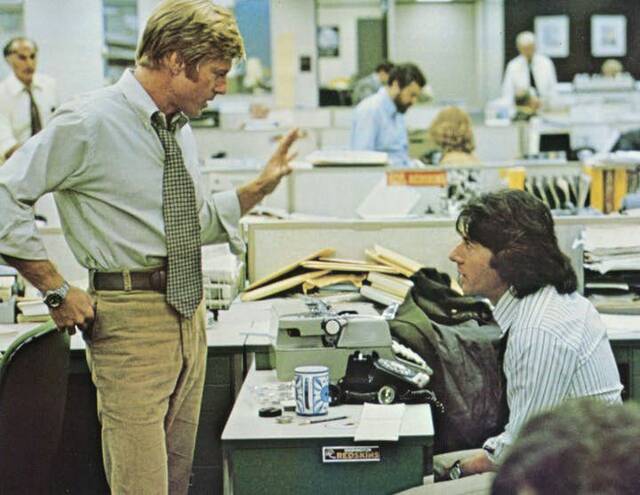https://triblive.com/opinion/lori-falce-how-a-movie-star-made-people-want-to-be-journalists/
Lori Falce: How a movie star made people want to be journalists

When the news of Robert Redford’s passing came on Tuesday, it struck me hard.
I believe it struck a lot of journalists the same way.
For those of us of a certain age, Redford was not Waldo Pepper or Jay Gatsby or Jeremiah Johnson. He may have been the shadow of the Sundance Kid or the best baseball player ever, Roy Hobbs, but that isn’t the first place our minds go.
For us, Robert Redford was Bob Woodward. He was the vanguard of the new age of journalism being born in the 1970s. He was the guy who held the White House to account on Watergate — following the money and finding the truth and pouring it out in black ink in front of the world.
I admit this is somewhat unfair to the real Bob Woodward, a man who started his career at a D.C. weekly before joining the Washington Post as a reporter and becoming one of its most important voices for decades. He has written about every president for 54 years, as well as the Supreme Court and the Pentagon.
But while Woodward, like any good editor, did the heavy lifting behind the scenes, it was Redford who we saw doing the work on screen. We saw the fight to get information. We saw the struggle for confirmation with multiple sources. We saw the importance of accuracy and collaboration.
And more than anything, we saw the responsibility for an active, engaged press to fulfill its responsibility to the First Amendment by acting as a check on the powerful.
It’s worth noting here that “check” in this context is not meant as a limit. A journalist does not have that power. But when we check anything, whether spelling or facts, it is a test of rightness. What happens afterward is for others to decide.
But it is undeniable that “All the President’s Men,” Woodward’s 1974 book and the Redford-led 1976 movie, had an impact on the news industry. According to a 1977 article in The Atlantic, the number of journalism students across the country in 1960 was 11,000, but by that printing had jumped to 64,000.
Why? It wasn’t just Redford’s perfect blond hair and expressive blue eyes — although movie-star good looks no doubt helped.
What started with the leak of the Pentagon Papers and their publishing by the Washington Post and the New York Times in 1971 was made clear with Watergate. Journalism matters in a way that was not fully appreciated before. And Redford made it clear that sometimes, Superman wasn’t the hero; it was Clark Kent.
As one editor at TribLive said after rewatching “All the President’s Men” in Redford’s honor Tuesday, it gave him an exhilarating “Let’s do journalism!” feeling coming in to work Wednesday.
That’s something we all need right now — and that goes for the people who read the news and those who write it. We all need to appreciate the role we play in producing responsible journalism and consuming it.
I owe my introduction to “All the President’s Men” to my mother’s decades-long love affair with Redford. I called her immediately after hearing the news of his passing to express my condolences in her time of grief.
But for those of us who owe our careers to Redford’s portrayal of one of the most influential practitioners of our craft, this isn’t a time to don mourning. It’s a time to do him proud.
Copyright ©2026— Trib Total Media, LLC (TribLIVE.com)
